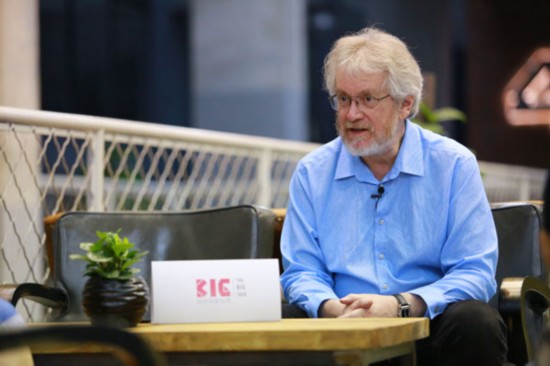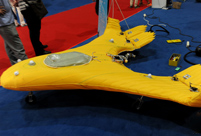 Chinese lingerie brand arrives in Las Vegas
Chinese lingerie brand arrives in Las Vegas
 In pics: YOG prism
In pics: YOG prism
 Amputee girl reaches top of half-left tower in Jiangxi
Amputee girl reaches top of half-left tower in Jiangxi
 Yardangs in Lop Nur
Yardangs in Lop Nur
 Intoxicating Ayding Lake in Xinjiang
Intoxicating Ayding Lake in Xinjiang
 Beijing's MJ impersonator a 'thriller' for crowds
Beijing's MJ impersonator a 'thriller' for crowds
 Armed police compete on the plateau
Armed police compete on the plateau
 Rubber Duck settles in Guiyang new urban area
Rubber Duck settles in Guiyang new urban area
 Rare set of giant panda triplets turn one month old
Rare set of giant panda triplets turn one month old
 Attractive posters to welcome freshmen
Attractive posters to welcome freshmen

Alex Pentland, MIT Media Lab Professor. (Source: China.org.cn)
Little known outside the realm of crowd science, MIT Media Lab Professor Alex Pentland, dubbed the "father of wearables" and one of the world's seven most powerful data scientists, has outlined his vision for big data and his take on Baidu's big data strategy, China's largest search engine, in a wide-raging interview with China.org.cn.
"The world is bigger than China, so Baidu has come to grips with that at some point," he said. "If you look at where its innovation comes from, it comes from all over the world."
"So that's part of Baidu's decision to be part of the innovation of the whole world, not just China's innovation," the professor said.
Impressive with Baidu's success in predicting the outcomes of the World Cup, Pentland described its prediction product as a result of deep learning techniques.
"We are getting much better at doing that sort of prediction. Some deep learning techniques are genuinely better than AI machines used to be, and may better than humans in some ways," he said.
Baidu's World Cup prediction service outperformed its major competitors, including Microsoft, Google and Golden Sachs, by accurately forecasting the winners of 58.3 percent of the games, compared with runner-up Microsoft Bing's 56.2 percent.
Deep learning is one of the directions that Baidu is currently working towards. In January 2013, Baidu's founder and CEO Robin Li announced the establishment of a research lab dedicated to "deep learning" -- an emerging computer science field that seeks to mimic the human brain with hardware and software.
If Baidu's success in predicting the outcomes of World Cup matches has demonstrated only a tip of its ambition in big data, its increasing presence in a host of data-related industries has sent a strong signal: The era of big data has come.
Baidu has announced plans to roll out a range of products and services based on big data analysis, in areas such as disease prevention, real estate, recuitment and finance.
Pentland said this means Baidu has found many good ways to morph data into useful applications or products.
The firm has teamed up with the Chinese Center for Disease Control and Prevention to use big data to forecast flu outbreaks. The other splash that Baidu made recently was its partnership with the UN to build a lab that aims to use big data technology to solve global issues like environmental protection and disaster relief.
Commenting on Baidu's position as a leading search engine in the world's most populous nation, Pentland said, "Baidu has strong technologies and a strong position, making it one of the major companies in the world in this area."
He also added that Baidu should have good choice in the future about how it continues to grow and develop.
 "Twin flowers" bloom in the air
"Twin flowers" bloom in the air China names 80 Anti-Japanese War memorial sites
China names 80 Anti-Japanese War memorial sites The 4th China-Eurasia Expo opens in Urumqi
The 4th China-Eurasia Expo opens in Urumqi Tall girls shine at model competition
Tall girls shine at model competition Girl who cannot gain weight: She is 1, 2.9 kilograms
Girl who cannot gain weight: She is 1, 2.9 kilograms Bazinga! Watch out the 'facekini' fashion bomb attack
Bazinga! Watch out the 'facekini' fashion bomb attack Experiencing maiden voyage between Sanya and Xisha
Experiencing maiden voyage between Sanya and Xisha Chinese inflatable aircraft meets public for the first time
Chinese inflatable aircraft meets public for the first time People enjoy delicacies in Tianjin undersea tunnel
People enjoy delicacies in Tianjin undersea tunnel Capital Spirits: the capital's first liquor bar
Capital Spirits: the capital's first liquor bar 2014 int’l drone exhibition
2014 int’l drone exhibition Chengdu International Auto Show
Chengdu International Auto Show Trainings taken by Chinese navy divers
Trainings taken by Chinese navy divers Anti-terrorism electric patrol car
Anti-terrorism electric patrol car Female PLA honor guards
Female PLA honor guardsDay|Week|Month